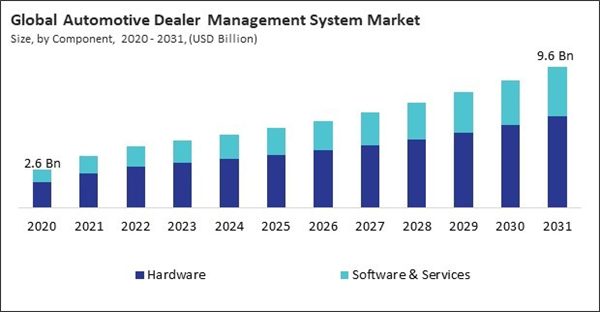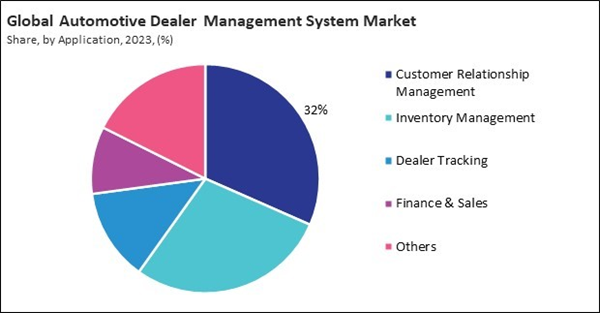Dealer tracking systems provide detailed insights into the performance of individual salespeople and dealerships. Consequently, the dealer tracking segment acquire nearly 13% of the market share by 2031. By tracking sales activities, conversion rates, and overall performance, dealerships can identify high-performing individuals and areas that need improvement, leading to optimized sales strategies and better overall performance.
Dealerships are under constant pressure to improve operational efficiency and reduce costs. DMS platforms offer integrated solutions for various aspects of dealership management, including inventory management, sales, finance, and customer relationship management (CRM). In addition, DMS platforms enable dealerships to standardize processes across multiple departments and locations. By implementing consistent workflows and procedures, dealerships can ensure uniformity in operations, reduce errors, and improve overall productivity. Therefore, increasing demand for streamlined operations is driving the market’s growth. Additionally, DMS platforms enable dealerships to gather and analyze customer data, including purchase history, preferences, and behavior. By leveraging this information, dealerships can personalize customer interactions, providing tailored recommendations, promotions, and service offerings that enhance the overall experience. Furthermore, many DMS platforms include features for appointment scheduling and service management. In conclusion, a growing focus on customer experience propels the market’s growth.
However, DMS vendors typically charge licensing fees for their software, which can vary based on the platform’s features, functionalities, and scalability. In addition, migrating existing data from legacy systems to the new DMS platform and converting it into a compatible format can be time-consuming and resource intensive. Also, considering the cumulative expenses associated with software licensing, customization, hardware, training, support, and maintenance, a DMS platform’s total cost of ownership (TCO) can be significant. Dealerships must carefully evaluate and budget for these costs to ensure the financial feasibility of DMS adoption. Thus, the high implementation costs are hampering the market’s growth.
Component Outlook
Based on component, the market is divided into hardware and software & services. The software & services segment attained 33% revenue share in the market in 2023. Data-driven decision-making is crucial for dealerships. DMS software provides powerful analytics and reporting tools that offer insights into sales performance, inventory levels, customer behavior, and service efficiency. These insights help dealerships optimize their operations and make informed business decisions.Application Outlook
Based on application, the market is categorized into inventory management, finance & sales, customer relationship management, dealer tracking, and others. The inventory management segment witnessed 28.3% revenue share in the market in 2023. Efficient inventory management helps dealerships maintain optimal stock levels. This guarantees that they have the appropriate cars and parts on hand without understocking, which could result in lost sales or overstocking, which would require capital. Also, having the right inventory on hand allows dealerships to meet customer demands promptly. This improves customer satisfaction as clients can find and purchase the necessary vehicles or parts without delays.Deployment Outlook
On the basis of deployment, the market is segmented into on-cloud and on-premise. In 2023, the on-cloud segment attained 46% revenue share in the market. Cloud-based DMS solutions offer significant scalability, allowing dealerships to easily expand their operations or adjust their system capabilities based on changing needs without substantial additional investments in hardware. This model also allows for predictable ongoing costs and eliminates the need for expensive hardware maintenance and upgrades.Regional Outlook
Region-wise, the market is analyzed across North America, Europe, Asia Pacific, and LAMEA. The North America region witnessed a 35% revenue share in the market in 2023. North America is a hub for technological innovation, and dealerships in this region are quick to adopt advanced technologies. The demand for cutting-edge DMS solutions is driven by the need to integrate new technologies such as machine learning, artificial intelligence, and IoT into dealership operations.List of Key Companies Profiled
- Wipro Limited
- Irium Software (ISAGRI)
- The Reynolds and Reynolds Company
- Quorum Information Technologies Inc.
- Autosoft, Inc. (Tsi Auto Solutions Inc.)
- Oracle
- CDK Global, Inc. (Brookfield Business Partners L.P.)
- Dealertrack Inc. (Cox Automotive, Inc.)
- GaragePlug Inc.
- PBS Financial Systems Inc.
Market Report Segmentation
By Component
- Hardware
- Software & Services
By Application
- Customer Relationship Management
- Inventory Management
- Dealer Tracking
- Finance & Sales
- Others
By Deployment
- On-Premise
- On-Cloud
By Geography
- North America
- US
- Canada
- Mexico
- Rest of North America
- Europe
- Germany
- UK
- France
- Russia
- Spain
- Italy
- Rest of Europe
- Asia Pacific
- China
- Japan
- India
- South Korea
- Singapore
- Malaysia
- Rest of Asia Pacific
- LAMEA
- Brazil
- Argentina
- UAE
- Saudi Arabia
- South Africa
- Nigeria
- Rest of LAMEA
Table of Contents
Companies Mentioned
- Wipro Limited
- Irium Software (ISAGRI)
- The Reynolds and Reynolds Company
- Quorum Information Technologies Inc.
- Autosoft, Inc. (Tsi Auto Solutions Inc.)
- Oracle
- CDK Global, Inc. (Brookfield Business Partners L.P.)
- Dealertrack Inc. (Cox Automotive, Inc.)
- GaragePlug Inc.
- PBS Financial Systems Inc.










